- Home
- Sebastian Faulks
War Stories Page 10
War Stories Read online
Page 10
We knew our ‘stunt’ was approaching as the ridge in front of us steadily took more shelling. Tension increased, and the routine wariness that had characterized our waking moment was replaced by neurotic edgy alarm. We kept expecting to be pulled out of the line for a period of rest before the attack but we appeared to have been forgotten. Even Teague and Somerville-Start were subdued. As for myself, I had evolved a new approach. I decided to be logical. I was going, as far as possible, to think my way to survival, even if it meant disobeying orders.
We stood to at half past four, an hour before dawn. Our objectives were the two ruined farms. D company was going for the right-hand one, along with the Bantams on our right flank. We were to capture the farm, secure it and repel any counterattack until the second wave passed us. All night the ridge had been pounded by our guns. As we lined up in the fire trench the bombardment was still going on. Louise passed among us, white-faced and muttering what I suppose were words of encouragement. I could not hear him above the noise of the shells. Beside me stood Pawsey. On the other side was Somerville-Start. He held a ladder, so did I. I was as ready as I would ever be.
But I had forgotten about the rum. The quartermaster-sergeant passed among us pouring out the tots from the big ceramic bottle. The rum looked black, evil, thick as molasses. I drank my allocation – half a wine glass, I suppose – in two gulps, and I was seriously drunk within a minute. I saw Pawsey vomit his issue and lean gagging against the trench wall. Somerville-Start’s face wore a kind of fixed, zealous grimace – he was breathing fiercely through his nose, both hands on his ladder.
Then everyone urinated. I suppose an order must have been given. The trench filled with vinegary urine-steam. I was giddy. I felt the trench had acquired a steep, dipping gradient to the left, down which I might at any moment slide. I held on to my ladder, and adjusted the weight of my sack of bombs. I never heard the whistle go but suddenly I saw people begin to climb their ladders. Somerville-Start and I set off simultaneously.
I do not remember my first unprotected view of no man’s land – that initial astonishing second – because Somerville-Start got shot in the mouth. The moment his face cleared the parapet I saw his teeth shatter as they were hit by the bullet and a plume of blood, like a pony tail, issued from the nape of his neck. Several teeth, or teeth fragments, hit me in the face, stinging me like thrown gravel, and one piece cut me badly above my right eye. My eye filled with warm blood and I blundered over the sandbags blindly, wiping my eye with my sleeve. I sensed Pawsey going by me. My vision cleared and I saw him running off in the direction of the ridge. There was no sign of the ridge itself – the creeping barrage some fifty yards in front of us obscured everything.
‘Think!’ I said out loud. I crouched down and scampered forward, almost on all fours, like a baboon.
‘Stand up, that man!’ somebody bellowed.
I ignored him.
We were now, I realized, being shelled in our turn and I suppose there must have been machine-gun fire from somewhere because I saw some Bantams on my right gently falling over. I scrabbled after the creeping barrage, dragging my rifle on the ground. As far as I was concerned the world was still canted over towards the left and I kept falling over heavily on my left side, bruising my left knee. I moved like some demented cripple.
Then a shell exploded near me and the blast of air snatched my rifle from my grasp and whipped my helmet from my head. Warm earth hit my face and I felt the weal of the chin strap hot on my throat. I was stunned immobile for some seconds. Then, crab-like, I scuttled into the fuming crater.
Kite was already there, on his back, wounded. He held up the stump of his right arm, fringed like a brush, not bleeding but clotted with earth.
‘Somebody’s gone and shot my bloody arm off!’ he shouted.
I blinked. I screwed up my eyes to adjust focus.
‘Damn nuisance,’ Kite said. He seemed wholly unperturbed.
I wondered if I should help him.
‘D’you want a hand?’ I yelled, in all innocence.
‘Very funny, Todd,’ he said petulantly. ‘Hardly the time or place.’ He began to move. ‘I can make it on my own.’ He crawled back towards our lines.
I looked around. I could not see a soul. The din was so general it seemed quite normal, like the factory floor of an iron foundry . . . I still had my sack of bombs. I wondered where I should throw them. I slithered forward, past some small dead Bantams. I saw what looked like a horrifically mangled side of beef, flayed by a maniac butcher with an axe. At the top there was an ear, some hair and part of a cheek. At the bottom, a bare knee with a smudge of dirt on it.
I crawled on until I reached some tangled wire. The German line? I glanced back. I could make out nothing. I turned: was that the farmhouse up ahead? It should have been easy for me to determine – we were meant to run uphill after all – but my dipping, left-biased world had made me immune to gradients. I had the disarming impression, all at once, that I was in fact moving parallel to our front line. So I turned, with some difficulty, right, leaning into the slope and felt I was falling. I immediately ran across Pawsey and Louise. Pawsey was shot through the chest. He had dry cherry foam on his lips. He was trying to speak but only pink bubbles formed and popped in his mouth. Louise, I guessed, had gone to help him and – so it seemed – had been caught by a concentrated burst of machine-gun fire in the throat, which was badly torn. He was quite dead. One bullet had taken off his nose with the neatness of a razor.
I looked up. The barrage had lifted. I could not hear the dreary clatter of machine-gun fire. I saw Bantams running back to our lines. More bubbles popped between Pawsey’s lips. I grabbed him under the arms and began to drag him back to safety. I had not gone ten yards when he died. There is an unmistakable limpness about a dead person that no living being can imitate. Instinct tells you when it has arrived. But I needed no instinct, remember: I had dragged dead men from the surf at Croxyde Bains. Poor Pawsey felt the same.
I laid him down. There was no point in dragging back a dead man. Heavy firing was coming from further up the line, and a few shells were now bursting on the ridge, more an acknowledgement of the attack’s failure than an attempt to silence the German guns. My section of no man’s land was now strangely quiet. All the same I zig-zagged back to the lines moving carefully from shell hole to shell hole. In one particularly large hole I saw a couple of Bantams searching corpses for loot. I passed by on the other side.
I was helped into the trench by men I did not recognize. This must be the second wave of the attack, I guessed, whose presence had not been required. I was passed down the line into the support trenches. Eventually I found my bits and pieces and sat down. I felt terrible. My brain was tender and bruised. I was nauseous. My mouth was dry and rank. My legs were visibly shaking and my joints ached. So this is battle fatigue, I thought. I know now I was suffering from a massive hangover. My first.
After a while I managed to light a cigarette. I put my trench cap on and waited for the others. Then I began to remember, piecemeal. Kite, with no hand. Louise and Pawsey dead . . .
A corporal from another platoon came over. He looked very tired.
‘Any sign of Lieutenant McNeice?’
I told him about Louise. And Kite and Pawsey. I wondered if the others were all right.
‘I don’t know,’ he said. ‘I can’t find a soul from my platoon.’
‘You haven’t seen any of my lot, have you?’
‘I saw someone . . . well, explode. Must have been a bomber. Whole sacks of bombs went up. Took about five chaps with him.’
‘Good God!’
‘Are you all right?’ he said. ‘You’ve got blood all over your face.’
‘Just a scratch,’ I said reflexively, followed by a warm spurt of pride at my nonchalance. I put my hand up to my forehead. I felt a curious lump embedded above my eyebrow. It moved. I plucked it out with a wince. It was a tooth. One of Somerville-Start’s incisors. I still have the scar.
; The delayed shock arrived about an hour later. It was not so much what I had witnessed that overwhelmed me as the retrospective sense of awful peril I had been in. I saw myself running foolishly here and there about the battlefield, somehow avoiding the multitudinous trajectories of thousands of pieces of whizzing hot metal. I was not grateful for my luck. I was horrified, if you like, that I had used up so much. We all have narrow escapes in life, of some of which we are entirely unaware. What upset me was the hundreds of thousands of narrow escapes I must have had during my few hectic minutes in no man’s land. I was convinced I had overdrawn my balance of good fortune; that whatever haphazard benevolence the impassive universe might hold towards me was all but gone.
Siegfried Sassoon
MY OWN LITTLE SHOW
The poet Siegfried Sassoon describes his war experiences in his autobiographical novel Memoirs of an Infantry Officer (1930). In 1917 he has lost all faith in the war and becomes increasingly hostile towards the official line and ‘the people at home who couldn’t understand’. He decides that the only way out of this senseless situation is to embark on ‘death or glory’ and to ‘make a little drama out of my own experience’. This opportunity arises when he has to lead a bombing party into the enemy trenches.
Part of the interest of the passage lies in the question of what level of irony Sassoon is dealing in; a question thrown into a harsher light by the extract from Pat Barker’s Regeneration that follows.
ON SATURDAY AFTERNOON we came to Saulty, which was only ten miles from Arras and contained copious indications of the offensive, in the form of ammunition and food dumps and the tents of a Casualty Clearing Station. A large YMCA canteen gladdened the rank and file, and I sent my servant there to buy a pack full of Woodbines for an emergency which was a certainty. Canteens and estaminets would be remote fantasies when we were in the devastated area. Twelve dozen packets of Woodbines in a pale green cardboard box were all that I could store up for the future consolation of B Company; but they were better than nothing, and the box was no weight for my servant to carry.
Having seen the men settled into their chilly barns and sheds, I stuffed myself with coffee and eggs and betook myself to a tree stump in the peaceful park of a white château close to the village. Next day we were moving to our concentration area, so I was in a meditative mood and disposed to ask myself a few introspective questions. The sun was just above the treetops; a few small deer were grazing; a rook flapped overhead; and some thrushes and blackbirds were singing in the brown undergrowth. Nothing was near to remind me of the war; only the enormous thudding on the horizon and an aeroplane humming across the clear sky. For some obscure reason I felt confident and serene. My thoughts assured me that I wouldn’t go back to England tomorrow if I were offered an improbable choice between that and the battle. Why should I feel elated at the prospect of the battle, I wondered. It couldn’t be only the coffee and eggs which had caused me to feel so acquiescent. Last year, before the Somme, I hadn’t known what I was in for. I knew now; and the idea was giving me emotional satisfaction! I had often read those farewell letters from second-lieutenants to their relatives which the newspapers were so fond of printing. ‘Never has life brought me such an abundance of noble feelings,’ and so on. I had always found it difficult to believe that these young men had really felt happy with death staring them in the face, and I resented any sentimentalizing of infantry attacks. But here I was, working myself up into a similar mental condition, as though going over the top were a species of religious experience. Was it some suicidal self-deceiving escape from the limitless malevolence of the front line? . . . Well, whatever it was, it was some compensation for the loss of last year’s daydreams about England (which I could no longer indulge in, owing to an indefinite hostility to ‘people at home who couldn’t understand’). I was beginning to feel rather arrogant toward ‘people at home’. But my mind was in a muddle; the war was too big an event for one man to stand alone in. All I knew was that I’d lost my faith in it and there was nothing left to believe in except ‘the Battalion Spirit’. The Battalion Spirit meant living oneself into comfortable companionship with the officers and NCOs around one; it meant winning the respect, or even the affection, of platoon and company. But while exploring my way into the war I had discovered the impermanence of its humanities. One evening we could be all together in a cosy room in Corbie, with Wilmot playing the piano and Dunning telling me about the eccentric old ladies who lived in his mother’s boarding house in Bloomsbury. A single machine-gun or a few shells might wipe out the whole picture within a week. Last summer the First Battalion had been part of my life; by the middle of September it had been almost obliterated. I knew that a soldier signed away his independence; we were at the front to fight, not to think. But it became a bit awkward when one couldn’t look even a week ahead. And now there was a steel curtain down between April and May. On the other side of the curtain, if I was lucky, I should meet the survivors, and we should begin to build up our little humanities all over again.
That was the bleak truth, and there was only one method of evading it; to make a little drama out of my own experience – that was the way out. I must play at being a hero in shining armour, as I’d done last year; if I didn’t, I might crumple up altogether. (Self-inflicted wounds weren’t uncommon on the Western Front, and brave men had put bullets through their own heads before now, especially when winter made trench warfare unendurable.) Having thus decided on death or glory, I knocked my pipe out and got up from the tree stump with a sense of having solved my problems. The deer were still grazing peacefully in the park; but the sun was a glint of scarlet beyond the strip of woodland and the air was turning chilly. Along the edge of the world that infernal banging was going on for all it was worth. Three Army Corps were to attack on Easter Monday.
‘Secret. The Bombing Parties of 25 men will rendezvous at 2.30 a.m. tomorrow morning, 16th inst. in shafts near C Coy. HQ. The greatest care will be taken that each separate Company Party keeps to one side of the Shaft and that the Dump of Bombs be in the trench at the head of these shafts, suitably split. The necessity of keeping absolute silence must be impressed on all men. These parties (under 2nd Lt. Sherston) will come under the orders of O.C. Cameronians at ZERO minus 10. Lt. Dunning and 2 orderlies will act liaison and report to O.C. Cameronians at ZERO minus 5. While the parties are in the shaft they must keep a free passage way clear for runners, etc.’
Such was the document which (had I been less fortunate) would have been my passport to the Stygian shore. In the mean time, with another two hours to sit through, we carried on with our world without end conversation. We were, I think, on the subject of Canterbury Cricket Week when my watch warned me that I must be moving on. As I got up from the table on which we’d been leaning our elbows, a blurred version of my face looked at me from the foggy mirror with an effect of clairvoyance. Hoping that this was an omen of survival, I went along to the rendezvous-shaft and satisfied myself that the bombing parties were sitting on the stairs in a bone-chilling draught, with my two subordinate officers in attendance.
Zero hour was 3 a.m. and the prefatory uproar was already rumbling overhead. Having tightened my mud-caked puttees and put my tie straight (there was no rule against wearing a tie in an attack) diffidently I entered the Cameronian HQ dugout, which was up against the foot of the stairs. I was among strangers, and Zero minus 10 wasn’t a time for conversational amenities, so I sat self-consciously while the drumming din upstairs was doing its utmost to achieve a reassuring climax. Three o’clock arrived. The tick-tacking telephone-orderly in a corner received a message that the attack had started. They were over the barrier now, and bombing up the trench. The Cameronian Colonel and his Adjutant conversed in the constrained undertones of men who expect disagreeable news. The Colonel was a fine-looking man, but his well-disciplined face was haggard with anxiety. Dunning sat in another corner, serious and respectful, with his natural jollity ready to come to the surface whenever it was called for.
At the end of twenty minutes’ tension the Colonel exclaimed abruptly, ‘Good God, I wish I knew how they’re doing!’ . . . And then, as if regretting his manifestation of feeling, ‘No harm in having a bit of cake, anyhow.’ There was a large home-made cake on the table. I was offered a slice, which I munched with embarrassment. I felt that I had no business to be there at all, let alone helping to make a hole in the Colonel’s cake, which was a jolly good one. I couldn’t believe that these competent officers were counting on me to be of any use to them if I were required to take an active part in the proceedings upstairs. Then the telephone-orderly announced that communication with Captain Macnair’s headquarters had broken down; after that the suspense continued monotonously. I had been sitting there about two and a half hours when it became evident that somebody was descending the steps in a hurry. HQ must have kept its cooking utensils on the stairs, for the visitor arrived outside the doorway in a clattering cascade of pots and pans. He was a breathless and dishevelled sergeant, who blurted out an incoherent statement about their having been driven back after advancing a short distance. While the Colonel questioned him in a quiet and controlled voice I rose stiffly to my feet. I don’t remember saying anything or receiving any orders, but I felt that the Cameronian officers were sensitive to the delicacy of my situation. There was no question of another slice of home-made cake. Their unuttered comment was, ‘Well, old chap, I suppose you’re for it now.’
Leaving them to get what satisfaction they could from the sergeant’s story, I grinned stupidly at Dunning, popped my helmet on my head, and made for the stairway. It must have been a relief to be doing something definite at last, for without pausing to think I started off with the section of twenty-five who were at the top of the stairs. Sergeant Baldock got them on the move at once, although they were chilled and drowsy after sitting there for over three hours. None of them would have been any the worse for a mouthful of rum at that particular moment. In contrast to the wearisome candlelight of the lower regions, the outdoor world was bright and breezy; animated also by enough noise to remind me that some sort of battle was going on. As we bustled along, the flustered little contingent at my heels revived from its numbness. I had no idea what I was going to do; our destination was in the brain of the stooping Cameronian guide who trotted ahead of me. On the way we picked up a derelict Lewis gun, which I thought might come in handy though there was no ammunition with it. At the risk of being accused of ‘taking the wrong half of the conversation’ (a favourite phrase of Aunt Evelyn’s) I must say that I felt quite confident. (Looking back on that emergency from my arm-chair, I find some difficulty in believing that I was there at all.) For about ten minutes we dodged and stumbled up a narrow winding trench. The sun was shining; large neutral clouds voyaged willingly with the wind; I felt intensely alive and rather out of breath. Suddenly we came into the main trench, and where it was widest we met the Cameronians. I must have picked up a bomb on the way, for I had one in my hand when I started my conversation with young Captain Macnair. Our encounter was more absurd than impressive. Macnair and his exhausted men were obviously going in the wrong direction, and I was an incautious newcomer. Consequently I had the advantage of him while he told me that the Germans were all round them and they’d run out of bombs. Feeling myself to be, for the moment, an epitome of Flintshire infallibility, I assumed an air of jaunty unconcern; tossing my bomb carelessly from left hand to right and back again, I inquired, ‘But where are the Germans?’ – adding ‘I can’t see any of them.’ This effrontery had its effect (though for some reason I find it difficult to describe this scene without disliking my own behaviour). The Cameronian officers looked around them and recovered their composure. Resolved to show them what intrepid reinforcements we were, I assured Macnair that he needn’t worry any more and we’d soon put things straight. I then led my party past his, halted them, and went up the trench with Sergeant Baldock – an admirably impassive little man who never ceased to behave like a perfectly trained and confidential manservant. After climbing over some sort of barricade, we went about fifty yards without meeting anyone. Observing a good many Mills bombs lying about in little heaps, I sent Baldock back to have them collected and carried further up the trench. Then, with an accelerated heart beat, I went round the corner by myself. Unexpectedly, a small man was there, standing with his back to me, stock still and watchful, a haversack of bombs slung over his left shoulder. I saw that he was a Cameronian corporal; we did not speak. I also carried a bag of bombs; we went round the next bay. There my adventurous ardour experienced a sobering shock. A fair-haired Scotch private was lying at the side of the trench in a pool of his own blood. His face was grey and serene, and his eyes stared emptily at the sky. A few yards further on the body of a German officer lay crumpled up and still. The wounded Cameronian made me feel angry, and I slung a couple of bombs at our invisible enemies, receiving in reply an egg-bomb, which exploded harmlessly behind me. After that I went bombing busily along, while the corporal (more artful and efficient than I was) dodged in and out of the saps – a precaution which I should have forgotten. Between us we created quite a demonstration of offensiveness, and in this manner arrived at our objective without getting more than a few glimpses of retreating field-grey figures. I had no idea where our objective was, but the corporal informed me that we had reached it, and he seemed to know his business. This, curiously enough, was the first time either of us had spoken since we met.

 Devil May Care
Devil May Care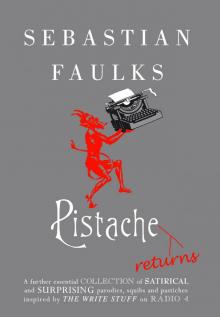 Pistache Returns
Pistache Returns The Girl at the Lion D'Or
The Girl at the Lion D'Or Pistache
Pistache Jeeves and the Wedding Bells
Jeeves and the Wedding Bells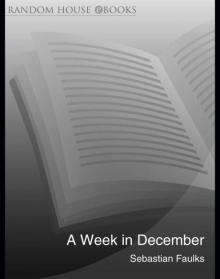 A Week in December
A Week in December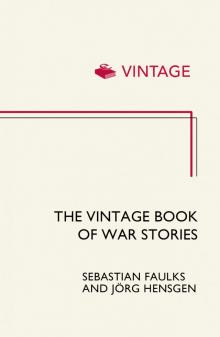 The Vintage Book of War Stories
The Vintage Book of War Stories Engleby
Engleby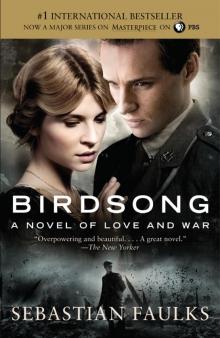 Birdsong
Birdsong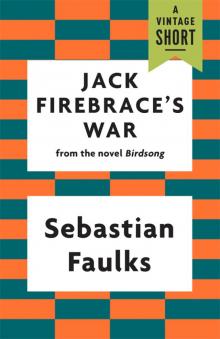 Jack Firebrace's War
Jack Firebrace's War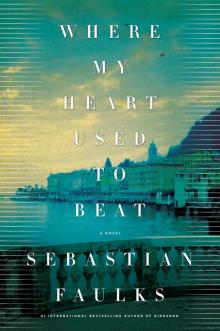 Where My Heart Used to Beat
Where My Heart Used to Beat A Possible Life
A Possible Life The Fatal Englishman: Three Short Lives
The Fatal Englishman: Three Short Lives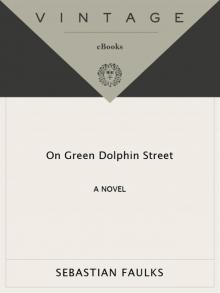 On Green Dolphin Street
On Green Dolphin Street Charlotte Gray
Charlotte Gray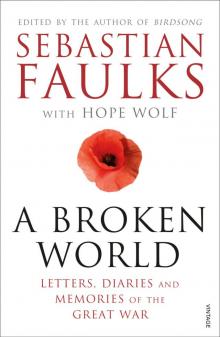 A Broken World: Letters, Diaries and Memories of the Great War
A Broken World: Letters, Diaries and Memories of the Great War Human Traces
Human Traces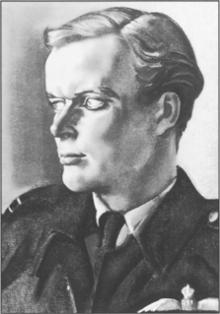 The Fatal Englishman
The Fatal Englishman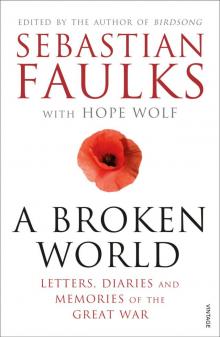 A Broken World
A Broken World Paris Echo
Paris Echo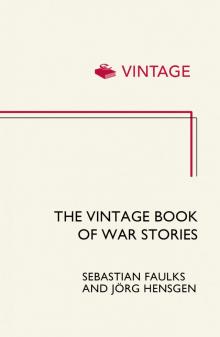 War Stories
War Stories Girl At the Lion d'Or
Girl At the Lion d'Or